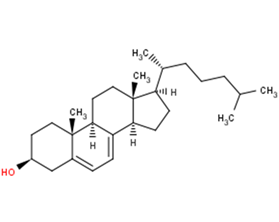
7-Dehydrocholesterol
CAS No. 434-16-2
7-Dehydrocholesterol( 7-DHC | Provitamin D3 )
Catalog No. M19772 CAS No. 434-16-2
7-Dehydrocholesterol down-regulates cholesterol biosynthesis in cultured Smith-Lemi-Opitz syndrome skin fibroblasts.
Purity : >98% (HPLC)
 COA
COA
 Datasheet
Datasheet
 HNMR
HNMR
 HPLC
HPLC
 MSDS
MSDS
 Handing Instructions
Handing Instructions
| Size | Price / USD | Stock | Quantity |
| 100MG | 42 | In Stock |


|
| 200MG | Get Quote | In Stock |


|
| 500MG | Get Quote | In Stock |


|
| 1G | Get Quote | In Stock |


|
Biological Information
-
Product Name7-Dehydrocholesterol
-
NoteResearch use only, not for human use.
-
Brief Description7-Dehydrocholesterol down-regulates cholesterol biosynthesis in cultured Smith-Lemi-Opitz syndrome skin fibroblasts.
-
Description7-Dehydrocholesterol down-regulates cholesterol biosynthesis in cultured Smith-Lemi-Opitz syndrome skin fibroblasts.(In Vitro):7-Dehydrocholesterol is a biosynthetic precursor of cholesterol and vitamin D3. 7-Dehydrocholesterol is present in relatively high concentration in skin where it is converted to pre-vitamin D3 upon UV irradiation and where it is also exposed to exogenous radical sources and oxygen.
-
In Vitro7-Dehydrocholesterol is a biosynthetic precursor of cholesterol and vitamin D3. 7-Dehydrocholesterol is present in relatively high concentration in skin where it is converted to pre-vitamin D3 upon UV irradiation and where it is also exposed to exogenous radical sources and oxygen.
-
In Vivo——
-
Synonyms7-DHC | Provitamin D3
-
PathwayProteasome/Ubiquitin
-
TargetEndogenous Metabolite
-
RecptorHuman Endogenous Metabolite
-
Research Area——
-
Indication——
Chemical Information
-
CAS Number434-16-2
-
Formula Weight384.64
-
Molecular FormulaC27H44O
-
Purity>98% (HPLC)
-
SolubilityDMSO:10mM
-
SMILESCC(C)CCC[C@@H](C)[C@H]1CC[C@H]2C3=CC=C4C[C@@H](O)CC[C@]4(C)[C@H]3CC[C@]12C
-
Chemical Name——
Shipping & Storage Information
-
Storage(-20℃)
-
ShippingWith Ice Pack
-
Stability≥ 2 years
Reference
1.Lehmann B Genehr T Knuschke P et al. UVB-Induced Conversion of 7-Dehydrocholesterol to 1α25-Dihydroxyvitamin D3 in an In Vitro Human Skin Equivalent Model[J]. Journal of Investigative Dermatology 2001 117(5):1179.
molnova catalog



related products
-
3-Methylvaleric Acid
3-Methylvaleric Acid is an edible grade flavor present in tobacco.3-Methylvaleric Acid enhances intracellular cAMP accumulation and CRE-luciferase activity in CHO-K1 cells and HEK293 cells.
-
N-Methyl-DL-glutamic...
2-(Methylamino)pentanedioic acid (N-Methyl-DL-glutamic acid) is an endogenous metabolite that inhibits Glutaminase, adds freshness to edible products, and can be used in tuberculosis research.
-
3-Amino-4-methylpent...
Beta-leucine?is a beta-amino acid that is?pentanoic acid?substituted at positions 3 and 4 by?amino?and?methyl?groups respectively. It has a role as a human metabolite.



 Cart
Cart
 sales@molnova.com
sales@molnova.com


